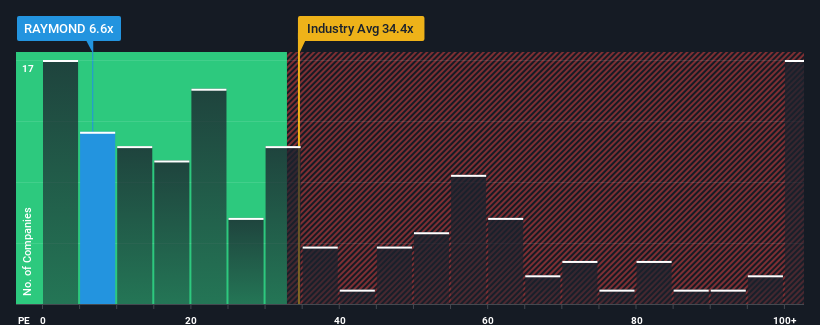Raymond Limited's (NSE:RAYMOND) Price Is Right But Growth Is Lacking
Raymond Limited's (NSE:RAYMOND) price-to-earnings (or "P/E") ratio of 6.6x might make it look like a strong buy right now compared to the market in India, where around half of the companies have P/E ratios above 33x and even P/E's above 62x are quite common. However, the P/E might be quite low for a reason and it requires further investigation to determine if it's justified.
Raymond could be doing better as it's been growing earnings less than most other companies lately. It seems that many are expecting the uninspiring earnings performance to persist, which has repressed the P/E. If this is the case, then existing shareholders will probably struggle to get excited about the future direction of the share price.
View our latest analysis for Raymond

How Is Raymond's Growth Trending?
There's an inherent assumption that a company should far underperform the market for P/E ratios like Raymond's to be considered reasonable.
If we review the last year of earnings growth, the company posted a worthy increase of 11%. Although, the latest three year period in total hasn't been as good as it didn't manage to provide any growth at all. Therefore, it's fair to say that earnings growth has been inconsistent recently for the company.
Shifting to the future, estimates from the lone analyst covering the company suggest earnings growth is heading into negative territory, declining 9.2% per annum over the next three years. That's not great when the rest of the market is expected to grow by 19% per annum.
In light of this, it's understandable that Raymond's P/E would sit below the majority of other companies. However, shrinking earnings are unlikely to lead to a stable P/E over the longer term. Even just maintaining these prices could be difficult to achieve as the weak outlook is weighing down the shares.
The Key Takeaway
Typically, we'd caution against reading too much into price-to-earnings ratios when settling on investment decisions, though it can reveal plenty about what other market participants think about the company.
We've established that Raymond maintains its low P/E on the weakness of its forecast for sliding earnings, as expected. At this stage investors feel the potential for an improvement in earnings isn't great enough to justify a higher P/E ratio. It's hard to see the share price rising strongly in the near future under these circumstances.
We don't want to rain on the parade too much, but we did also find 3 warning signs for Raymond (1 makes us a bit uncomfortable!) that you need to be mindful of.
Of course, you might also be able to find a better stock than Raymond. So you may wish to see this free collection of other companies that have reasonable P/E ratios and have grown earnings strongly.
New: AI Stock Screener & Alerts
Our new AI Stock Screener scans the market every day to uncover opportunities.
• Dividend Powerhouses (3%+ Yield)
• Undervalued Small Caps with Insider Buying
• High growth Tech and AI Companies
Or build your own from over 50 metrics.
Have feedback on this article? Concerned about the content? Get in touch with us directly. Alternatively, email editorial-team (at) simplywallst.com.
This article by Simply Wall St is general in nature. We provide commentary based on historical data and analyst forecasts only using an unbiased methodology and our articles are not intended to be financial advice. It does not constitute a recommendation to buy or sell any stock, and does not take account of your objectives, or your financial situation. We aim to bring you long-term focused analysis driven by fundamental data. Note that our analysis may not factor in the latest price-sensitive company announcements or qualitative material. Simply Wall St has no position in any stocks mentioned.
About NSEI:RAYMOND
Excellent balance sheet with reasonable growth potential.
Similar Companies
Market Insights
Community Narratives



